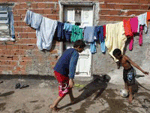Brazil: People evicted from favelas for the World Cup and the Olympic Games.
Published on Tue, 2011-08-30 07:17
Source: Inesc Thousands of people in favelas (shanty towns) in Rio de Janeiro are being evicted from their homes as Brazil prepares for the 2016 Olympic Games, and the same is happening in other cities that will host matches during the 2014 World Cup. According to the lawyer Roberto Benedito Barbosa, an activist in the Sao Paulo Union of Housing Movements (UMM), this is being done "to move the poor farther and farther away from rich neighbourhoods”. This matter has already reached the United Nations where it is giving cause for concern. The Brazilian urban specialist Raquel Rolnik, a United Nations spokesperson for the Right to Decent Housing, has spoken out against the evictions in recent months. Her office has received reports of evictions in Sao Paulo, Rio de Janeiro, Belo Horizonte, Curitiba, Porto Alegre, Recife, Natal and Fortaleza. According to the Spanish newspaper Público and the Argentine Página 12, when Rolnik submitted her latest study in May she stated that thousands of people had been evicted from their dwellings, and she appealed to the Brazilian government to start a dialogue with the communities in question. Barbosa believes the wave of evictions was set in motion by powerful interests in the property business, and that this goes beyond preparations for sporting events. He said that the football World Cup “serves these interests”. Maria das Graças, an activist in the UMM, explained that in fact these sporting events were accelerating a process that was already in operation. Favelas were being cleared off land of great potential value for property developers, and the excuse was that "…the cities had to be made beautiful and spotlessly clean for the visitors." In a process that started last year, the favela Metro Mangueira, which is near the Maracaná stadium in Rio de Janeiro, is being demolished little by little. By the time the World Cup and the Olympic Games come round, the houses that are there today will have been replaced by gigantic parking facilities and shopping centres. According to the newspaper, some people’s homes were demolished when they had gone out to work. Maria das Graças said that in Sao Paulo alone some 50,000 families will be driven from their homes because of the upcoming World Cup. Rolnik said she was “…particularly worried about what seems to be a pattern in this wave of evictions. There is no transparency, consultation or dialogue with the communities that have been or will be displaced in the run-up to the World Cup and the Olympic Games.” The UN official told the newspaper Público that the evictions are being carried out “with total disregard for (Brazilian or international) law … In most cases there is no dialogue with the communities involved, and the compensation the people are paid is far less than it should be." The best the inhabitants can expect is a so-called “rental cheque” of 300 reais (186 dollars) per month for 30 months. Rolnik said this amount is "clearly not enough" to rent a place to live in Sao Paulo, even in the favelas, and after 30 months these families find themselves on the street. For example, a woman named Raimunda, who had lived in the Favela do Sapo in Sao Paulo for 35 years, was threatened with eviction by the local authorities and forced to leave her home. The 300 reais per month she received is insufficient and she has to pay another 100 reais out of her own pocket to rent accommodation in a nearby area. Rolnik pointed out that "It is laid down by law that removal must be the last resort, that there has to be dialogue with the people involved, and that people who are evicted must be provided with housing that is of the same or better standard than what they had”. As Barbosa remarked, “The construction companies pay for the election campaigns”. Página 12 reported that in Rio de Janeiro a municipal decree has been issued authorising the eviction of 3,600 families. Soraide Gomes, who has lived in this favela for 28 years, said, “In Prazeres we have one of the best views in Rio … I believe this is why they wanted to get us out, because this land is worth a fortune.” |
SUSCRIBE TO OUR NEWSLETTER



